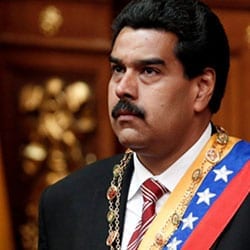Christmas came early in Venezuela last year, due to the political maneuvering of President Nicolás Maduro. The president “reassigned” the holiday to Nov. 1 to boost public morale and, he hoped, the economy. This year’s holiday season also comes with a package of Christmas-related policies: Safe Christmas Plan 2014 (“Plan Navidad Segura 2014”) and Operation Merry Christmas (“Operación Navidades Felices”), which carry the relevance of the Christmas season in a predominately Catholic country, but with varying political content. One focuses on security planning, and the other has economic aims.
The Safe Christmas Plan ramps up patrolling around shopping centers and upholds a list of security measures ranging from alcohol control to bank security. The plan was designed to include the National Armed Forces (Fuerza Armada Nacional Bolivariana, FANB) along with national and municipal police. Installed on Nov. 1, this plan was reviewed by Carmen Meléndez, Venezuela’s minister of interior relations, justice and peace, and was deemed successful in Caracas, where the streets were made more secure during overnight hours.
On the economic side, Maduro’s Operation Merry Christmas was met with more controversy. The initiative enforces mandatory discounts of popular gift items like plasma TVs and refrigerators. The most contentious of the discounted items are the imported Barbie dolls selling for only 250 bolivars, or $2.50. Not only are retailers distressed over the price controls (in the midst of severe inflation), but also loyal leftists are confused by Maduro’s support of the Barbie, which was earlier criticized by Hugo Chávez as being a “Western-imposed consumerist icon.”
The coincidence of these Christmas policies — besides their festive titles — is the role they might play in smoothing out a larger crisis of scarcity and inflation in the country. In September of this year, Venezuela had the highest inflation in Latin America at 63.4 percent. Shortages have left Venezuelans without essential food items, and rationing was introduced in October despite the public’s frustration. Falling oil prices and the recent thawing of U.S.-Cuban relations also bode poorly for the Venezuelan regime. So, is Maduro now using the more palatable frame of a cultural occasion — Christmas — to address a larger political crisis?
The question is whether these creative, piecemeal policies can stand in as a replacement for long-term economic policy. As the Barbie controversy suggests, Maduro’s initiatives engage more with a battle of symbols than with a logic of politics. If the loyal Chavista president is willing to go back on an anti-consumerist stance made by Chávez himself (regarding the Barbie as a symbol of Western consumerism), the overall coherence of Maduro’s political strategy becomes questionable.
In Maduro’s politics, ideology and history compete regularly with present-day realities. There is often a blending of cultural and political traditions, as evidenced by these recent initiatives along with more extreme actions like Maduro’s appropriation of the Christian prayer “Our Father” to honor his predecessor Hugo Chávez. Earlier this year, Maduro changed the words of the prayer to address Chávez and his legacy and then had it read aloud at the start of his party’s conference on Sept. 1. This prompted a direct response from the Catholic Church in Venezuela: Archbishop of Caracas Jorge Urosa rejected the “Our Chávez” as a form of idolatry and declared the original prayer to be “untouchable.” In this more extreme example, Maduro blurred (and crossed) the lines between cultural and political authority and received open pushback from the church as a result.
The caricatures of politics and culture that Maduro has woven into real policies in recent months could raise questions across the international community and especially from those countries relying on a stable Venezuela for trade and cooperation. Instead of dismissing these actions — the “Our Chávez” prayer and the militarization of Christmas, for example — as some kind of isolated “creativity” on the part of Maduro, it is important to contextualize them within Venezuela’s broader path toward democracy. How long has ideology and political aesthetic — the talk more than the walk — taken priority over concrete policies and initiatives? This is an important question to consider across many evolving democracies, both new and old, in today’s political climate.
Kristin Foringer is an intern for the Baker Institute’s Latin America Initiative and a senior at Rice University majoring in policy studies and Hispanic studies with a minor in sociology.
